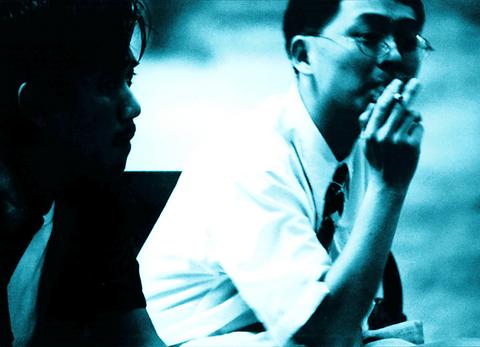As part of "Theater for Two," the title of this year's month-long Eslite Basemant Festival, Party Theater Group (
The story is set in Taipei's 228 Park, a favorite meeting place for homosexual men. Under a pale lamp light and the heavy shade of a tree, A-hong, an effeminate boy waits for his lover, Wu, a divorced father of two. When Wu arrives visibly exhausted from work and taking care of his kids, A-hong's earnest hope for a relationship in the open falls on deaf ears. The two painfully realize there's no way for them to have a normal relationship. They decide never to see each other again as the melody from Everytime We Say Goodbye starts wafting through the air.
Later on, Yolk, a sadomasochist looking for true love; Mosquito, a bisexual who dates his boss behind his girlfriend's back and other characters enter the story. For each, there's something lacking in their love life.

PHOTO COURTESY OF ESLITE
Chiu An-chin (
"After so many years, people can still identify with these characters and their problems. It's sad, because that shows that misunderstandings about homosexuals are still prevalent," Chiu said.
Eden will be performed at 7:30pm tonight, 2:30pm and 7:30pm tomorrow and 2:30pm tomorrow in the basement of Eslite's Tunhwa branch. Tickets are available through Acer Ticketing outlets at NT$450.

May 18 to May 24 Pastor Yang Hsu’s (楊煦) congregation was shocked upon seeing the land he chose to build his orphanage. It was surrounded by mountains on three sides, and the only way to access it was to cross a river by foot. The soil was poor due to runoff, and large rocks strewn across the plot prevented much from growing. In addition, there was no running water or electricity. But it was all Yang could afford. He and his Indigenous Atayal wife Lin Feng-ying (林鳳英) had already been caring for 24 orphans in their home, and they were in

On May 2, Chinese Nationalist Party (KMT) Chairman Eric Chu (朱立倫), at a meeting in support of Taipei city councilors at party headquarters, compared President William Lai (賴清德) to Hitler. Chu claimed that unlike any other democracy worldwide in history, no other leader was rooting out opposing parties like Lai and the Democratic Progressive Party (DPP). That his statements are wildly inaccurate was not the point. It was a rallying cry, not a history lesson. This was intentional to provoke the international diplomatic community into a response, which was promptly provided. Both the German and Israeli offices issued statements on Facebook

President William Lai (賴清德) yesterday delivered an address marking the first anniversary of his presidency. In the speech, Lai affirmed Taiwan’s global role in technology, trade and security. He announced economic and national security initiatives, and emphasized democratic values and cross-party cooperation. The following is the full text of his speech: Yesterday, outside of Beida Elementary School in New Taipei City’s Sanxia District (三峽), there was a major traffic accident that, sadly, claimed several lives and resulted in multiple injuries. The Executive Yuan immediately formed a task force, and last night I personally visited the victims in hospital. Central government agencies and the

Australia’s ABC last week published a piece on the recall campaign. The article emphasized the divisions in Taiwanese society and blamed the recall for worsening them. It quotes a supporter of the Taiwan People’s Party (TPP) as saying “I’m 43 years old, born and raised here, and I’ve never seen the country this divided in my entire life.” Apparently, as an adult, she slept through the post-election violence in 2000 and 2004 by the Chinese Nationalist Party (KMT), the veiled coup threats by the military when Chen Shui-bian (陳水扁) became president, the 2006 Red Shirt protests against him ginned up by